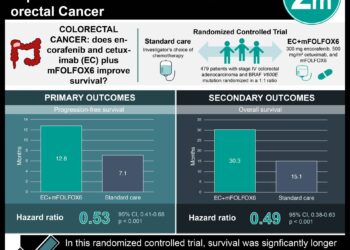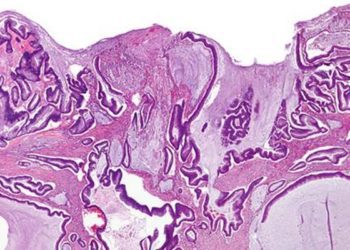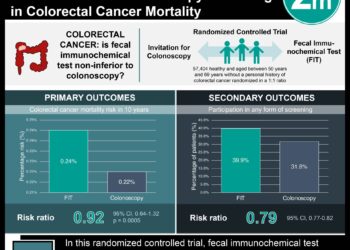Reducing the screening age for colorectal cancer in Canada to 40 or 45 may result in fewer cases, less mortality, and reduced healthcare spending costs
1. Initiating colorectal cancer screening at age 45 results in 12,188 fewer cases and 5,261 fewer deaths over a 40 year period in four birth cohorts
2. There is a net benefit of $719 million and $1.1 billion when initiating screening at age 45 or 40, respectively, due to reduced spending on colorectal cancer treatment costs
Evidence Rating Level: 2 (Good)
Study Rundown: Currently, Canadian guidelines advise beginning screening for colorectal cancer (CRC) in average-risk adults starting at age 50 in most provinces, with a resultant decrease in the incidence of the disease. Because of an increasing incidence of CRC in adults younger than 50 years old, there have been recommendations to decrease the screening age to begin at age 45. This study used a microsimulation tool, OncoSim, to investigate the impact on incidence, mortality, and health system costs of a lowered initiation age for CRC screening in Canada. The primary outcome of this study was the incidence of CRC in simulated cohorts of Canadian citizens. Secondary outcomes included mortality and cost to the healthcare system. CRC incidence and mortality were both reduced as a result of initiating CRC screening at 45 years old, as compared to the current practice (50 years). A reduction of 12,188 cases was the result with 5,261 fewer deaths amongst the four cohorts examined over a 40 year period (beginning when the age of the cohort’s eldest members turned age 40 to when the youngest members turned 75 years old). When reducing the screening age to 40 years old, there were 18,135 fewer cases and 7,988 fewer deaths amongst all cohorts over a 40 year period. Regarding costs to the healthcare system, earlier screening was shown to raise costs for screening and any required treatment (an additional $298 million for beginning screening at age 45, or $649 million for beginning at age 40). However, there was a net decrease in healthcare spending of $719 million when initiating screening at age 45, and $1.1 billion when initiating at age 40, due to savings in the treatment management of CRC in these cohorts. Limitations to this study include that it was a simulated modelling study based on fictitious cohorts of Canadian citizens, and the results should be applied with caution, especially within other countries. However, the findings from this study are important and applicable to guidelines surrounding screening for CRC in Canada. Overall, the results from this study support that lowering the age of initiation for CRC screening in Canada could have positive downstream effects on incidence and mortality.
Click to read the study in the JAMA Oncology
Relevant Reading: Age at initiation of lower gastrointestinal endoscopy and colorectal cancer risk among US women.
In-Depth [prospective cohort]: This study was a simulated prospective study using simulated individuals with demographics that represented the average Canadian population. Four cohorts (1973-1977, 1978-1982, 1983-1987, 1988-1992) were analyzed in the OncoSim modelling program. Each scenario included 32 million simulated cases. An adenoma incidence rate multiplier was applied to each cohort to represent the increasing incidence of CRC within each cohort. These values were 1.17, 1.40, 1.91, and 2.29 respectively for each cohort grouping. Within the model, participation for the first screening was adjusted to 43%, representing statistics from pre-existing published data. A sensitivity analysis showed that even when participation in CRC screening was only 60% or the participation was set to 43% with no adenoma incidence multiplier, the results were similar to the main analysis showing a reduction in incidence and mortality.
Image: PD
©2023 2 Minute Medicine, Inc. All rights reserved. No works may be reproduced without expressed written consent from 2 Minute Medicine, Inc. Inquire about licensing here. No article should be construed as medical advice and is not intended as such by the authors or by 2 Minute Medicine, Inc.









